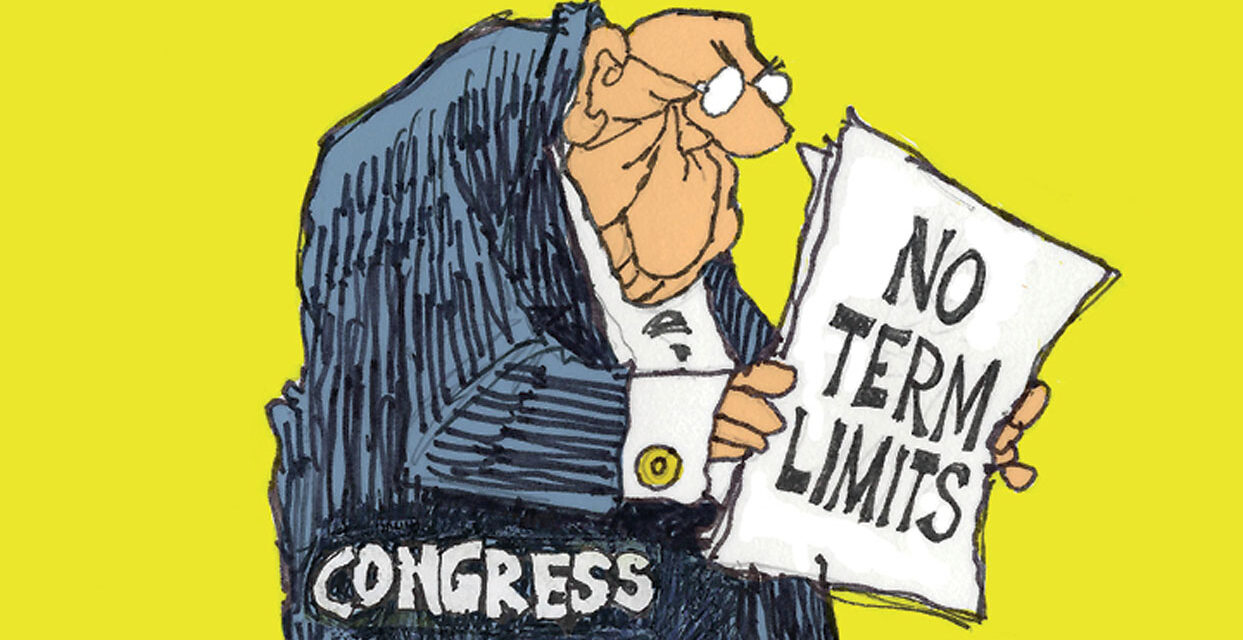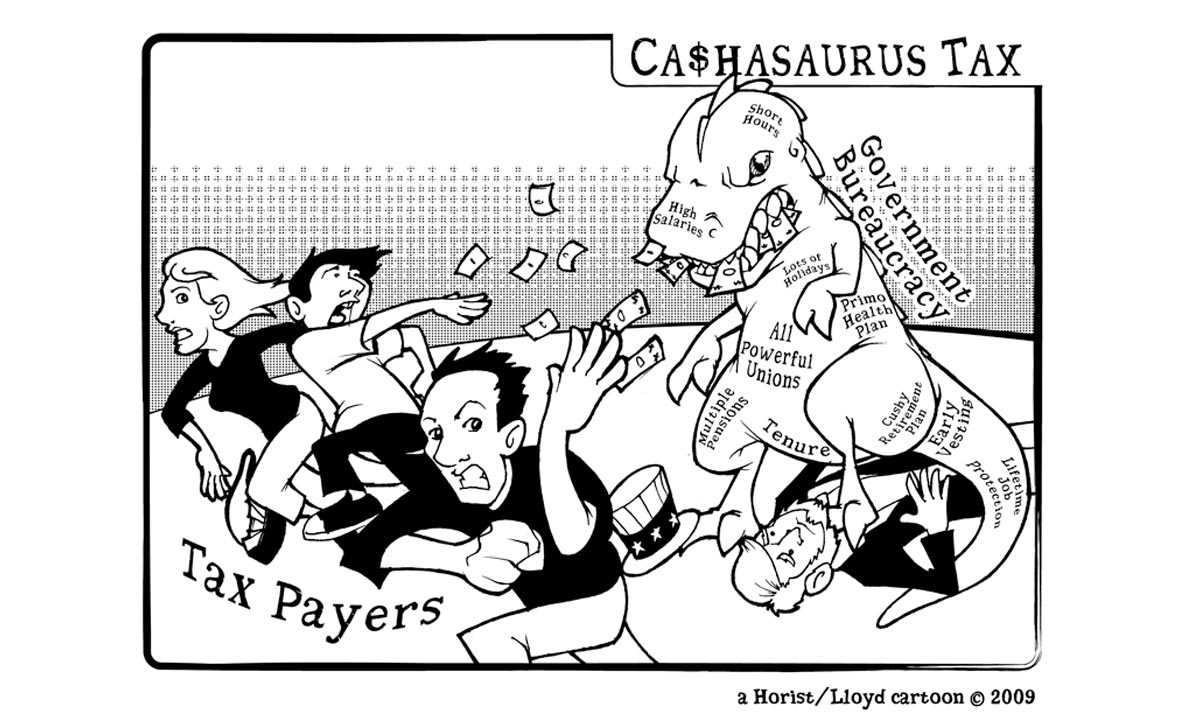
Congress dysfunction is making a strong case for term limits

While the Founders did not provide for term limits on federal officeholders, they did express their belief that they were unnecessary for several reasons. Most importantly, they did not plan for a full-time political profession — especially in terms of the House of Representatives.
Background
In terms of the Judiciary, the Founders clearly did not favor term limits when they made federal judgeships life-time appointments. They believed that not subjecting federal justices to an electoral process – or the dismissal by a President – the judges, and therefore the entire federal judiciary, could function without regard to the politics of the moment. They were largely correct in that assumption – but not entirely. Judges tend to follow the political philosophy of the President who appointed them, but the judiciary was still immune to dramatic shifts in membership and decisions based on the politics of the moment.
When it came to the Senate, the Founders provided for six-year terms – three times the length of House members. In addition, only one-third of the Senate would be up for election every two years. That would somewhat insulate the Senate from dramatic shifts in policy in any one election.
The Founders also had the senators from each state selected by the general assemblies – not by direct vote of the people. That came about with the 17th Amendment in 1913. The Founders approach had a term limit effect since it was very unlikely that state legislators would send the same person to the Senate for 30 or 40 years.
And that is another reason why the Founders may not have incorporated term limits in the Constitution. They did not expect folks to live the long and healthy lives we see today. They had every right to expect fate and Providence to limit the terms.
Though they did not enshrine term limits in the Constitution, the benefit of them – or the fear of long tenures – was seen in Washington’s calls for a two-terms limit on the presidency. That wise counsel was heeded until President Franklin Roosevelt broke precedent and successfully ran for a third term in 1940.
The wisdom was also recognized in FDR’s amazing of extraordinary power over his 12-plus year presidency. So much so that Congress passed the 22nd Amendment in a bipartisan vote – precluding future Presidents from serving more than eight years.
The House of Representatives
In terms of the House, the Founders may not have considered term limits because of the life expectancy of the day, but they also did not imagine a full-time around-the-clock legislature made up of career politicians. They saw it as an assembly of citizens taking temporary leave from their careers to serve the nation for a short period. They planned for and foresaw short legislative sessions – a few months each year.
They also did not envision a federal government as large and powerful as we have today. In fact, that was their existential fear. One could legitimately argue that it was the lack of term limits that led to the long professional political careers in Washington – which led to a semi-permanent establishment creating a powerful central government that reversed the polarities away from the rule of the people to an entrenched ruling class.
While we the people have lost enormous power over our lives, it is not too late to change the trajectory. We can shut down the political multi-generational political fiefdoms that control the process by forcing out the entrenched establishment. The best cure for the malady is term limits.
Why term limits?
The foremost benefit is that term limits prevent long-term entrenchment – and dynastic political leadership — with all the power-grabbing and corruption that goes along with it. When you tie long tenures to the “seniority system,” the longer a person is in Congress, the more powerful they become. It is not as a mere courtesy that we preface the title of the longest serving officials with the word “powerful” – the “powerful Senator …” or the “powerful chairman of …”.
Not only do term limits prescribe a fixed term of office, but it also means that the various chairmanships and leadership positions will change every couple of years. The turnover will make Congress more responsive to the will of the people at the moment.
There are many advantages to term limits.
- It would tend to minimize corruption. With only a brief time in Congress, members would not be influenced by long-term relationships with lobbying groups. With less focus on personal power and money, there would be greater focus on issues by both members and lobbyists.
- There would be a constant inflow of fresh ideas and more contemporary perspectives. Congress would not degrade into an old folks’ club. It is not only a matter of “old thinking” but of physical and mental debility – as we recently witnessed with California Senator Diane Feinstein.
- It would tend to reduce the power of incumbency, placing more emphasis on campaign issues when making voting decisions.
- True to the anticipation of the Founders, there would be a greater emphasis on “citizen legislators” from diverse backgrounds – reducing the influence of lawyers as a ruling-class.
- Eliminate the negative impact of “institutional memory.” Some argue that the loss of institutional memory is an argument in favor of the current system. But it is that institutional memory that has made the legislative process so complex and so corrupt.
- It would make the legislative process simpler – eliminating many of the convoluted “House rules” that work to the advantage of those who have had years to impose and understand them.
- Legislators would not have the same obsessive focus on reelection – and consumed by constant fundraising.
States and cities
Terms limits are not an untested theory. They have been enacted in cities and states across the nation. They vary from state to state. Governors and sometimes other statewide officeholders in 37 states face term limits of some kind. The most common (27) are two-term consecutive limits, indicating that after serving two terms the politician has to sit out some period of time before they can run again for the same seat. For example, in Wyoming and Oregon, governors are limited to two terms, but can come back for two more after a ONE term pause. In Montana, you can come back for two more terms after sitting out TWO cycles. In nine states, you have a strict lifetime two-term limit. And in Virginia, you are restricted to a lifetime ONE term.
In addition, 15 states impose term limits on state legislators, the terms of which vary from state to state. Ten of the 15 largest cities impose terms limits on municipal officials.
Convention of the States
Unfortunately, members of Congress have been reluctant to limit their own years in office. Even first-time candidates who pledge to support term limits – and even self-limit – change their minds once in office. The House has refused to send a Term Limit Amendment to the states for ratification – knowing that it would most certainly be ratified.
As a result of that political reality, U.S. Term Limits — the group leading the term limit movement – is promoting the alternative means to enact a constitutional amendment. It means to bypass the reluctant Congress with a Convention of the States.
Under Article V of the Constitution, states can call for a convention to enact amendments to the Constitution. So far, 19 states have passed a broader application that includes term limits. Several other states have passed a resolution in one chamber. And yet others have the resolutions under consideration. It would take 34 states to approve the resolution for a convention, and 38 states to enact an amendment.
Summary
Perhaps the strongest case for term limits is the will of the people. Between 70 and 80 percent of the people – according to most polls – would like to see Congress to pass term limits. If our elected representatives will not heed the will of the people, we need to replace them with legislators who will.
So, there ‘tis.
























Mr Horist spews the RHINO rhetoric harkening back to bygone days when Potsy hung with Richie and the Fonz. Along the way he espouses opinion as if fact without even so much as an IMO.
Not that I disagree with the destination, it’s just that his journey is a haphazard jumble of ideas, unsupported opinions, and age-old conservative mantra.
You do not disagree with the destination but you are going to criticize the writing? Did someone make you mad by taking your vodka nipple away from you Frank buddy?
I only saw two “may not”‘s that could have been attached to an IMO, but we all know such wording implies an opinion that may or may not be fully grounded in fact. The facts seem correct from what I know and remember from Civics class. The stat 70-80% is correct according to two independent sources. All in all, I thought this was a pretty well written piece that blended history, issue, and projection of the good that term limits might do.
I do not drink except rare occasion. 2022 in this case. A glass of red.
You really want example?
You know Horist gets upset if we bond!
Plus, it was short as prescribed by Mr Nice Guy….
Tom, I rarely drink. Last time was a glass of red in 2022 I think. You asked for proof which I am hesitant to give. You know how jealous Horist gets if it looks like we are in cahoots. Bromance I think he imagines it in his obsessions. But, for you, my brother from another mother, mr independent, even from his own thoughts…..here’s an example with comments in ().
“While we the people have lost enormous power over our lives, (no proof, he is relying on the general frustrations of Republicans and others) it is not too late to change the trajectory.(why not too late, why not too early?) We can shut down the political multi-generational political fiefdoms that control the process by forcing out the entrenched establishment. (since each offender is a single generation, what?) The best cure for the malady is term limits.(ok, that’s like saying “we can’t vote em out, so let’s vote em a time limit. What about the good ones, or the really, really good ones — doesn’t kicking them out defeat the purpose of a better Congress? Just saying…..there are pluses and minuses to term limits or unlimited)
And therein the point. A lot of ideas, very little substantiation, no identification of opinion, the reader must assume it’s ALL opinion. And lots of conclusions that, to this reader, just “ain’t necessarily so. Unless you already believe.
And that’s the point: he assumes facts not in evidence and makes his opinionated conclusion from that, as if fact too. So, assumption on top of opinion, assuming the reader agrees to all that, as apparently Tom does. And that’s OK, just not for me.
OK — not going to proofread mor this crap, it’s more of the same, Horist has been doing this for so long that he feels his readers are in his rowboat, pulling the oars in his pre-ordained direction. I will say:
1. I can agree, based on my readings of the founders, that it’s the people’s house meant to be as close to the people as it can be. Regular, average, type people can apply. Not politicians, not seasoned, just plain folks playing patriots —- it’s good. Maybe think about getting people who know the purse strings. IMO, term limits here are OK, but I would rather not. Let the people choose the people.
2. I don’t agree there should be term limits in the Senate. It would make the place either for simpletons or diminish the productivity over time. This place is tough, arcane, and practice makes better. Too complex to ever be perfect. We need professionals and experts in there, not media hounds. It’s not the place for raucous ideas but the place for serious, tedious, deliberation.
3. Age limits for sure. Just pick one.
But the devils in the details and for every benefit Horist has for term limits, I can give you one for benefits of a service lifetime. Every one.
Same can be said with business planning in my world:
1. We use a yearly business plan to drive everything. Sure, we may have multiyear as well, but they are window dressing to the yearly plan which is the only plan one will be graded on.
That makes us drive to a conclusion every 12 months with quarterly updates to avoid surprise changes.
2. Japan has a multi-year plan that drives everything. Rather than conclude a period in 12 months, that’s just step one of multi-year goals
That makes them drive farther out and accept short term modest steps at earlier years which is a real advantage over yearly planners. Not necessarily better, but it is an advantage.
Both of these methods have plusses and minuses. Likewise, to have or not to have term limits: each method has pluses or minuses.
For example, with term limits, there would be no Pelosi as Speaker and that would change a lot of history. Quit your applause for a second and think about the loss, in their prime, of Grassley, Hatch, McConnell, Lugar, and a whole lot of Republican champions before their time, just because of time.
I am more willing to say give it a try in the House, but even there think about living in a world where freshmen are the norm. I do not relish that.
Perhaps there is another way. How about just taking the money out of it. IOW== create a voting system based on popularity, where IF you are a legitimate candidate, you get a fixed amount of campaign funds and that’s it. Now there’s no need for hunting donations via favoritism, no lobbying dollars thrown to your campaign, and the big one, no corporate sponsorship. Does that not get you to the place you want to be without losing seasoned professionals in the process due to no other variable but time? Sort of like those car races where all vehicles are the same and only the driver and set-up differ.
Yes you have a valid point about not kicking out the good ones. I am not sure how to assess which is the better case, kicking out the bad ones (and one person’s bad is another person’s good), or keeping in the good ones. That would be a think tank job I suppose.
Sometimes I agree with his “opinions” because I have already read other research and articles that bear out his opinion.
#1 agree. #2 ok, Legislature for common folks, Senate for pros which will provide a certain level of knowledge retention and historical perspective. #3 age limits should be as for all working Americans. IF we have to retire at 70, so do they! This actually would be another way of implementing a term limit on some of them.
Yes I do acknowledge the validity of your tit for tat point about being able to match Larry’s itemized list with a listing of your own that speaks to the benefits of long term office holders. I am very in favor of taking the money out of it and felt this should always have been the case. It would allow for more people to run for office and be involved. And we should have some sort of federal resume which includes the demonstration of a grasp of the issues and a history of involvement with government. Ramaswamy or whatever the heck his name is that is running for president said in the first debate that he has only been voting for eight years! That came into my brain as he has not been involved with government and choosing our leaders for 4/5 of his life. I would never vote for a person like that. We did that once, it was called Trump. Never again!
I think you and I may be in agreement that perhaps some form of reform is needed but how do we get the people responsible for reform to reform themselves since they would be the very targets of the reform. Taking the money out, good idea – but they would have to vote on it. Making them go to the healthcare dot gov exchange for health insurance is another idea that they have consistently voted down. Efforts against lobbyists have mostly failed. Federal resumes and grasp of issues requirements have all been voted down. Hell, Trump was running for POTUS and did not know what the nuclear triad was! This should have been a key indicator that our system has a problem. And so I think where we finally end up at is term limits – but this too will be voted down consistently by those who are half way through their political career and need ten to fifteen more years.
The problem is that the people we hold responsible to reform the system are the targets of the reform and there is no incentive for them to change the system – because they are doing well just the way the system is.
Frank I LOVE your final idea. TAKE THE MONEY OUT OF THE CAMPAIGNS!!!!!! Boy, would that EVER change things. I agree there are far too many campaigns decided on how much money the supporters of the candidates can throw at it. No merit involved, just CASH! I heard that in a Democracy, folks should be considered equal, and the monied elite should have their say, but not to the point of controlling everyting. But the fact we are indeed a Republic rather than a true democracy has an effect, too. I agree that the current way of doing things is not near as good as it could be and should be. My most ardent desire would be psych checks on the older members of Congress. I’ve seen some of these doddering old guys and gals still in there when it looks like they don’t even know what day it is. I admit to being OLD. I’m 73 and am sure I’m sharper than the average guy my age, but I still am starting to have memory issues of certain sorts and just can’t stand up to do some things which used to be easy for me. I think retirement should be mandatory for those who can’t pass a competency test.
term limits
and
age limits with cognitive tests for ALL
and not to make a lifetime career
just look at what we have acting president and the mess, wars, inflation, housing, illegals
So you are a Writing teacher?
Did not know we were getting graded.
Thought this was an opinion section?
That is Larry’s opinion!
Darren … Frank Stetson is not knowledgeable or skilled enough to be a teacher. He is just obsessed with being my constant critic. It is his obsession. His reason for being. He seems to think he gains value and credibility by demeaning mine. He spends his time writing ABOUT me — or at least the me he invented in his mind. He seems to thrive on meaningless childish insults and jabs — and I have become his target. In this one, he says he agrees with my conclusions but has to snipe at his view of how I reached them. How pathetic is that? While he cannot ignore me, I mostly ignore him. I feel sorry for guy. Obsessions have the most negative impact on the obsessed.
Sorry Horist. I am trying to do better.
I have always been in favor of term limits. It would appear that the legal beagles have hijacked our government.
Good article Larry.
Career politicians have ruined the country. Both parties
Well I do not think this country is “ruined” but most career politicians on both sides that I can think of surely have put power and personal/election agendas ahead of what is best for We The People.
Once elected, most become mesmerized and entranced by all that comes with their new position. Being surrounded from day one by grand ostentation; official perks, and institutionalized rights to assumed authority. This precludes discussion on any notion approaching term-limits and age out bills being merely introduced just for consideration.
The “will of we the people” be damned, say those who see them selves as being where they are by the will of the people. 70%~ 80% polled want term limits, then we the people need to be responsible voters. Then, the electorate must stand and exercise control through the ballot.
Safe political districts guarantee elections as certain persons are returned term after term. IMO this outcome is anathema to the founders’ ideals for the emerging democratic republic. As, fresh in memory of the time was the war for independence from rule by titled aristocrats’ ruling class. Appointment for life is fundamental aristocratic thinking, not in the Constitution’s spirit of not explicitly worded in law.
History reveals that extreme longevity among representative office holders in both legislative houses came about by evolutionary processes. Over time possibly well meaning persons ran for elected office and prevailed. These individuals eventually assumed jaded philosophies resembling politicians. Those intent on parleying positional standing into personal power, influence, financial gain, and permanence.
Democracy seen by the founders in 250 years time has evolved into government benefiting a privileged fraction and not all the people.
Un-democratic as the situation has evolved to, the wholesale righting of the equality scale to a balanced state demands dynamic determined action from all sectors, resource investment, public, government, corporations, and private.
Democratic processes can work for the country in the matter of limiting legislators’ and SCOTUS judges’ terms in appointed and elected governmental offices. Turn government rule from the few as it is now by allowing greater turnover in Congress’ ranks.
12 years, and less, in government office produces general character rot otherwise known as “dead wood”.
Useful only for use as recycled matter or repurposed for alternate purposes.
Republican should be allowed to serve for life. Democrats only one term